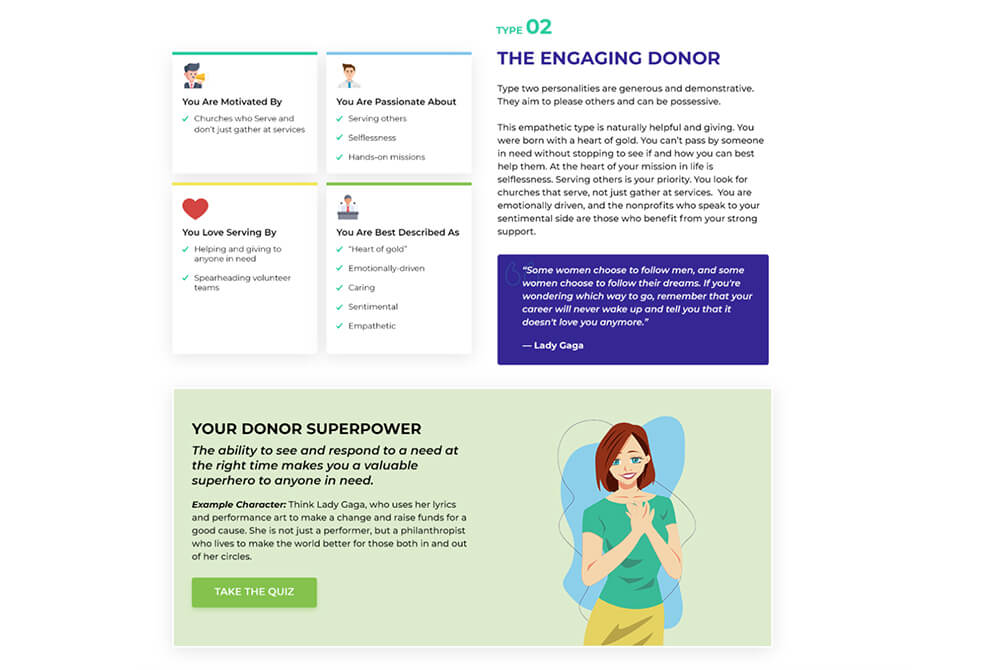Discovering the donor personality of each of your congregants is vital for growing your ministry. Our series on donor types will help you accomplish this feat.
Donor Type 1: The Purposeful Donor

Church members and donors have specific needs. As a church leader, you are aware of the varying personalities that enter your church doors for every service.
However, what many leaders overlook is that in order to reach a donor effectively and teach them more about giving, it’s important to understand their personal characteristics.
In this article, we look at the first type of donor: The Purposeful Donor. Learn more about how to define this personality, why it is important to understand, and what you can do as a leader to engage with the Purposeful Donor more effectively.
Understanding the Donor Personality Test
Our Donor Personality Test, modeled after the Enneagram, taught you how to define each personality in relation to the spiritual and emotional senses.
Remember the theory behind this test: each person is born with a dominant personality type that does not change throughout their life. But like other subtypes, this personality type is not set in stone. Your fellowship and teaching can target helping people learn more about their personalities, understand themselves better, and even have a higher inclination to give to the church.
Donor Type 1: The Purposeful Donor
A Type 1 donor personality is principled and purposeful. Additionally, they showcase self-control and have perfectionist qualities.
Typically, this type is organized and meticulous, always looking to make improvements. This donor lives to make the world a better place and wants to leave this earth with a positive legacy.
How to Identify the Purposeful Donor
- They constantly advocate for meaningful change.
- High levels of experience with nonprofits and usually get involved on a very personal level.
- Could already be a leader in the church, or they may have spearheaded humanitarian missions in the past.
- They prioritize leaving a positive legacy.
- People know them for showing up — they are first to volunteer or make other contributions of time, treasure, or talent.
How the Purposeful Donor Makes Decisions
The purposeful donor personality will never donate to “just any cause”. It needs to matter to them personally, and the bigger picture must motivate them. This personality has deep roots in a desire to make a difference. That means they look for causes that help the church on a greater level.
This is the ideal donor that every pastor hopes for. The Purposeful Donor helps to move the church’s vision forward. They are more than just giving financial aid. In the big picture, they are motivated by a lifelong passion and desire to make real and lasting change.
When and How Should You Approach this Donor for Giving?
Interactions with this donor type should not be taken for granted. When the Purposeful Donor gives you their time, it is a precious treasure. Always work to return value on their investment.
This type of donor personality focuses on big outreach projects and church programs. Limit your fundraising asks for when there is a significant need. Rather than encouraging monthly tithes or requesting donations towards a small goal, think about the bigger picture just as they do.
It is wise to present this type of donor with your church’s annual goals. Take some time to make a nice power-point presentation or invest in a platform that makes them a part of the church and outreach growth.
Because their gifts are considerably larger than those of the average donor, involve the Purposeful Donor in projects from the moment the idea launches to the day of action. Include them in follow up and outreach activities, as well. When this donor type sees how their gifts truly make a difference, they have more inspiration to give from the heart.
Always approach this donor thoughtfully and deliberately. You do not want to come across as frivolous in your financial requests, so demonstrate that you value their time as much as they do. Speak to their heart of giving and acknowledge that they do have a bigger picture in mind—their lifelong legacy.
All donor types receive careful treatment. But with this short brief, you’ll better understand the unique needs of the Purposeful Donor.
The Purposeful Donor’s Character
There are many examples in Scripture about this donor personality type. One of the most clear is the Bible character Moses, who we might consider a Type One. He was a true leader, whether advocating for change in the palace as a Prince of Egypt or leading the children of Israel across the Red Sea. His life became dedicated to his mission and left behind an amazing legacy. He remained steadfast and committed to a greater cause.
Now that you understand this donor type, what should you do with that information?
This type of donor has a great sense of purpose and appreciates when their work and service to the church gets acknowledged and recognized. You can include them in your monthly newsletter’s appreciation section, a page specifically designed for thanking those who have helped your church in a significant way.
Communicating with the Purposeful Donor
For internal communications, focus on sharing your insight with your team, so that all leaders understand the nature of this donor. If you lead other church managers, make sure that each is aware of the gifts that this donor has contributed to the church.
For external communications, make sure to use a personal touch in your interactions with the Purposeful Donor. They appreciate if you remember their birthdays, their work anniversaries, and other meaningful events in their lives. Your chats with them can be informal but use a business platform like LinkedIn to remind you of their achievements. These services offer a convenient method of contacting them for congratulatory greetings.
+++
If you liked this article, visit our site to learn more about the eight other Donor Personality Types.
For more tips and helpful suggestions for growing donors, read our blog posts on Donorwerx, or refer to the entire study on Donor Personality Types.


